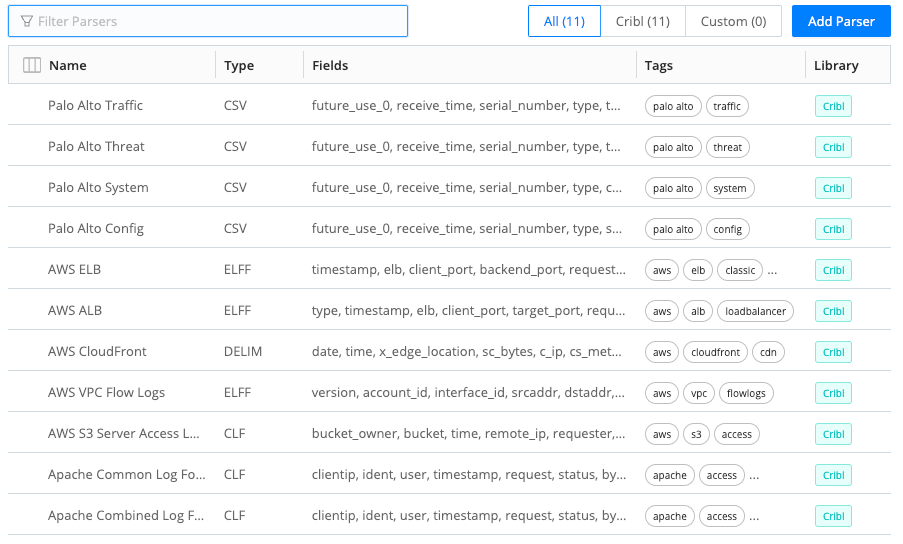Parsers
Define data to extract, using Parsers.
Parsers in Cribl Search are definitions for Datatypes and the extract operator.
To open the Parsers page, select Knowledge > Parsers. The Parsers page provides an interface for creating and editing Parsers. The table is searchable, and you can add Tags to each Parser as necessary.

For details about who can access and modify this resource, see Search Member Permissions.
Supported Parser Types
- CSV: Comma-separated values.
- Extended Log File Format: Extended Log File Format.
- Common Log Format: Common Log Format.
- Key=Value Pairs: A set of data that represents two associated groups through a key and a value.
- JSON Object: JavaScript Object Notation (JSON) is a standard text-based format for representing structured data based on JavaScript object syntax.
- Delimited values: A character identifies the beginning or the end of a character string.
- Regular Expression: A sequence of characters that specifies a match pattern in text.
- Grok: A string of special characters and regular expressions (pattern) that match data.
Creating a Parser
To create a Parser, follow these steps:
- Go to Knowledge > Parsers and select Add Parser.
- Enter a unique ID.
- Optionally, enter a Description.
- Optionally, enter any desired Tags.
- Select a Parser Type (see the supported types above).
- Enter the List of fields expected to be extracted, in order. Select this field’s advanced mode icon (far right) if you’d like to open a modal where you can work with sample data and iterate on results.
- Based on the Type selected, you’ll also have additional configurations. See the below sections for details, either Key=Value Pairs, Delimited Values, Regular Expressions, or Grok.
- Select Save when you’re finished.
Key=Value Pairs
- Clean fields: Whether to clean field names by replacing non-alphanumeric characters
[a-zA-Z0-9]with an underscore_. - Allowed key characters: A list of characters that can appear in a key name, even though they’re normally separator or control characters.
- Allowed value characters: A list of characters that can appear in a value name, even though they’re normally separator or control characters.
Delimited Values
- Delimiter: Delimiter character to use to split values.
- Quote character: Character used to quote values. Required if values contain the delimiter character.
- Escape character: Character used to escape characters within a value.
- Null value: String value that should be treated as null or undefined.
Regular Expression
- Regex: Regex literal with named capturing groups, for example,
(?<foo>bar). Or with_NAME_and_VALUE_capturing groups, for example,(?<_NAME_0>[^ =]+)=(?<_VALUE_0>[^,]+). - Additional regex: Add another regular expression to match against other data.
- Max exec: The maximum number of times to apply the regex to the source field when the global flag is set, or when using named capturing groups.
- Field name format expression: JavaScript expression to format field names when
_NAME_nand_VALUE_ncapturing groups are used. The original field name is in the global variablename. For example, to appendXXto all field names:${name}_XX(backticks are literal). If empty, names will be sanitized using this regex:/^[_0-9]+|[^a-zA-Z0-9_]+/g. You can access other field values via__e.<fieldName>. - Overwrite existing fields: Overwrite existing event fields with extracted values. If set to No, existing fields will be converted to an array.
Grok
- Pattern: Grok pattern to extract fields. Syntax supported:
%{PATTERN_NAME:FIELD_NAME}. - Additional Grok patterns: Add another pattern to match other data.





